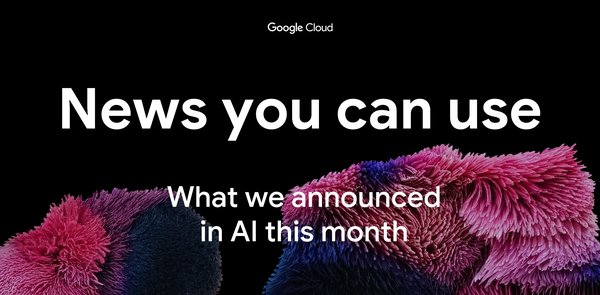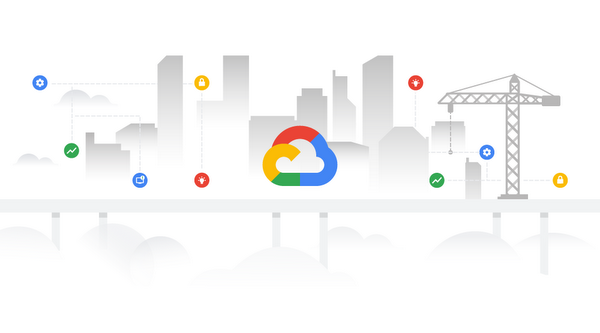Inside Google Cloud
Next_100.png
We hope you enjoyed Next ’19 as much as we did! The past few days brought our Google Cloud community together to learn about lots of new technologies and see how customers and partners are pushing their ideas and businesses forward with the cloud. It was a lot to digest, but we’ve boiled it down here into all the announcements from the week across infrastructure, application development, data management, smart analytics and AI, productivity, partnerships, and more.
-
1. We announced two new regions in Seoul, South Korea and Salt Lake City, Utah to expand our global footprint and to support our growing customers around the world.
-
2. Anthos (the new name for Cloud Services Platform) is now generally available on Google Kubernetes Engine (GKE) and GKE On-Prem, so you can deploy, run and manage your applications on-premises or in the cloud. Coming soon, we’ll extend that flexibility to third-party clouds like AWS and Azure. And Anthos is launching with the support of more than 30 hardware, software and system integration partners so you can get up and running fast.
-
3. With Anthos Migrate, powered by Velostrata‘s migration technology, you can auto-migrate VMs from on-premises or other clouds directly into containers in GKE with minimal effort.
-
4. Anthos Config Management lets you create multi-cluster policies out of the box that set and enforce role-based access controls, resource quotas, and namespaces–all from a single source of truth.
-
5. Cloud Run, our fully managed serverless execution environment, offers serverless agility for containerized apps.
-
6. Cloud Run on GKE brings the serverless developer experience and workload portability to your GKE cluster.
-
7. Knative, the open API and runtime environment, brings a serverless developer experience and workload portability to your existing Kubernetes cluster anywhere.
-
8. We’re also making new investments in our Cloud Functions and App Engine platforms with new second generation runtimes, a new open-sourced Functions Framework, and additional core capabilities, including connectivity to private GCP resources.
-
10. Apigee hybrid (beta) is a new deployment option for the Apigee API management platform that lets you host your runtime anywhere–in your data center or the public cloud of your choice.
-
11. Apigee security reporting (beta) offers visibility into the security status of your APIs.
-
12. Now you can consume a variety of Google Cloud services directly from the Apigee API Management platform, including Cloud Functions (secured by IAM), Cloud Data Loss Prevention (templates support), Cloud ML Engine, and BigQuery. See the full list of extensions here.
Databases
-
13. Coming soon to Google Cloud: bring your existing SQL Server workloads to GCP and run them in a fully managed database service.
-
14. CloudSQL for PostgreSQL now supports version 11, with useful new features like partitioning improvements, stored procedures, and more parallelism.
-
15. Cloud Bigtable multi-region replication is now generally available, giving you the flexibility to make your data available across a region or worldwide as demanded by your app.
Storage
-
16. A new low-cost archive class for Cloud Storage will offer the same consistent API as other classes of Cloud Storage and millisecond latency to access your content.
-
17. Cloud Filestore, our managed file storage system, is now generally available for high-performance storage needs.
-
18. Regional Persistent Disks will be generally available next week, providing active-active disk replication across two zones in the same region.
-
19. Bucket Policy Only is now in beta for Google Cloud Storage, so you can enforce Cloud IAM policies at the bucket level for consistent and uniform access control for your Cloud Storage buckets.
-
20. V4 signatures are now available in beta for Google Cloud Storage to provide improved security and let you access multiple object stores using the same application code. In addition to HMAC keys, V4 signed requests are also supported for Google RSA keys.
-
21. Cloud IAM roles are now available for Transfer Service, allowing security and IT administrators to use Cloud IAM permissions for creating, reading, updating, and deleting transfer jobs.
-
22. Traffic Director delivers configuration and traffic control intelligence to sidecar service proxies, providing global resiliency for your services by allowing you to deploy application instances in multiple Google Cloud regions.
-
23. High Availability VPN, soon in beta, lets you connect your on-premises deployment to GCP Virtual Private Cloud (VPC) with an industry-leading SLA of 99.99% service availability at general availability.
-
24. 100 Gbps Cloud Interconnect connects your hybrid and multi-cloud deployments.
-
25. Private Google Access from on-premises to the cloud is now generally available, allowing you to securely use Google services like Cloud Storage and BigQuery as well as third-party SaaS through Cloud Interconnect or VPN.
-
26. With Network Service Tiers, Google Cloud customers can customize their network for performance or price on a per-workload basis by selecting Premium or Standard Tier.
Security
-
27. Access Approval (beta) is a first-of-its-kind capability that allows you to explicitly approve access to your data or configurations on GCP before it happens.
-
28. Data Loss Prevention (DLP) user interface (beta) lets you run DLP scans with just a few clicks–no code required, and no hardware or VMs to manage.
-
29. Virtual Private Cloud (VPC) Service Controls (GA) go beyond your VPC and let you define a security perimeter around specific GCP resources such as Cloud Storage buckets, Bigtable instances, and BigQuery datasets to help mitigate data exfiltration risks.
-
30. Cloud Security Command Center, a comprehensive security management and data risk platform for GCP, is now generally available,
-
31. Event Threat Detection in Cloud Security Command Center leverages Google-proprietary intelligence models to quickly detect damaging threats such as malware, crypto mining, and outgoing DDoS attacks. Sign up for the beta program.
-
32. Security Health Analytics in Cloud Security Command Center automatically scans your GCP infrastructure to help surface configuration issues with public storage buckets, open firewall ports, stale encryption keys, deactivated security logging, and much more. Sign up for the alpha program.
-
33. Cloud Security Scanner detects vulnerabilities such as cross-site-scripting (XSS), use of clear-text passwords, and outdated libraries in your GCP applications and displays results in Cloud Cloud Security Command Center. It’s GA for App Engine and now available in beta for GKE and Compute Engine.
-
34. Security partner integrations with Capsule8, Cavirin, Chef, McAfee, Redlock, Stackrox, Tenable.io, and Twistlock consolidate findings and speed up response. Find them on GCP Marketplace.
-
35. Stackdriver Incident Response and Management (coming soon to beta) in Cloud Security Command Center helps you respond to threats and remediate findings.
-
36. Container Registry vulnerability scanning (GA) identifies package vulnerabilities for Ubuntu, Debian, and Alpine Linux, so you can find vulnerabilities before your containers are deployed.
-
37. Binary Authorization (GA) is a deploy-time security control that integrates with your CI/CD system, gating images that do not meet your requirements from being deployed.
-
38. GKE Sandbox (beta), based on the open-source gVisor project, provides additional isolation for multi-tenant workloads, helping to prevent container escapes, and increasing workload security.
-
39. Managed SSL Certificates for GKE (beta) give you full lifecycle management (provisioning, deployment, renewal and deletion) of your GKE ingress certificates.
-
40. Shielded VMs (GA) provide verifiable integrity of your Compute Engine VM instances so you can be confident they haven’t been compromised.
-
41. Policy Intelligence (alpha) uses ML to help you understand and manage your policies and reduce risk.
-
42. With Phishing Protection (beta), you can quickly report unsafe URLs to Google Safe Browsing and view status in Cloud Security Command Center.
-
43. reCAPTCHA Enterprise (beta) helps you defend your website against fraudulent activity like scraping, credential stuffing, and automated account creation and help prevent costly exploits from automated software.
Identity and access management
-
44. Context-aware access enhancements, including the launch of BeyondCorp Alliance, to help you define and enforce granular access to apps and infrastructure based on a user’s identity and the context of their request.
-
45. Android phone’s built-in security key–the strongest defense against phishing–is now available on your phone.
-
46. Cloud Identity enhancements, including single sign-on to thousands of additional apps and integration with human resource management systems (HRMS).
-
47. General availability of Identity Platform, which you can use to add identity management functionality to your own apps and services.
Data analytics
-
48. Data Fusion (beta) is a fully managed and cloud-native data integration service that helps you easily ingest and integrate data from various sources into BigQuery.
-
49. BigQuery DTS now supports 100+ SaaS apps, enabling you to lay the foundation for a data warehouse without writing a single line of code.
-
50. Cloud Dataflow SQL (public alpha) lets you build pipelines using familiar Standard SQL for unified batch and stream data processing.
-
51. Dataflow Flexible Resource Scheduling (FlexRS), in beta, helps you flexibly schedule batch processing jobs for cost savings.
-
52. Cloud Dataproc autoscaling (beta) removes the user burden associated with provisioning and decommissioning Hadoop and Spark clusters on Google Cloud Platform, providing you the same serverless convenience that you find in the rest of our data analytics platform.
-
53. Dataproc Presto job type (beta) helps you write simpler ad hoc Presto queries against disparate data sources like Cloud Storage and Hive metastore. Now both queries and scripts run as part of the native Dataproc API.
-
54. Dataproc Kerberos TLC (beta) enables Hadoop secure mode on Dataproc through thorough API support for Kerberos. This new integration gives you cross-realm trust, RPC and SSL encryption, and KDC administrator configuration capabilities.
-
55. BigQuery BI Engine, in beta, is an in-memory analysis service that lets interact with large or complex data almost immediately, for optional visual analysis with partner tools..
-
56. Connected sheets are a new type of spreadsheet that combines the simplicity of a spreadsheet interface with the power of BigQuery. With a few clicks, you can access BigQuery data in Sheets and securely share it with anyone in your organization.
-
57. BigQuery ML is now generally available with new model types you can call with SQL queries.
-
58. BigQuery: k-means clustering ML (beta) helps you establish groupings of data points based on axes or attributes that you specify, straight from Standard SQL in BigQuery.
-
59. BigQuery: import TensorFlow models (alpha) lets you import your TensorFlow models and call them straight from BigQuery to create classifier and predictive models right from BigQuery.
-
60. BigQuery: TensorFlow DNN classifier helps you classify your data, based on a large number of features or signals. You can train and deploy a DNN model of your choosing straight from BigQuery’s Standard SQL interface.
-
61. BigQuery: TensorFlow DNN regressor lets you design a regression in TensorFlow and then call it to generate a trend line for your data in BigQuery.
-
62. Cloud Data Catalog (beta), a fully managed metadata discovery and management platform, helps organizations quickly discover, manage, secure, and understand their data assets.
-
63. Cloud Composer (generally available) helps you orchestrate your workloads across multiple clouds with a managed Apache Airflow service.
AI and machine learning
-
64. AI Platform, in beta, helps teams prepare, build, run, and manage ML projects via the same shared interface.
-
65. AutoML Natural Language custom entity extraction and sentiment analysis (beta) lets you identify and isolate custom fields from input text and also train and serve industry-specific sentiment analysis models on your unstructured data.
-
66. AutoML Tables (beta) helps you turn your structured data into predictive insights. You can ingest your data for modeling from BigQuery, Cloud Storage, and other sources.
-
67. AutoML Vision object detection (beta) now helps you detect multiple objects in images, providing bounding boxes to identify object locations.
-
68. AutoML Vision Edge (beta) helps you deploy fast, high accuracy models at the edge, and trigger real-time actions based on local data.
-
69. AutoML Video Intelligence (beta) lets you upload your own video footage and custom tags, in order to train models that are specific to your business needs for tagging and retrieving video with custom attributes.
-
70. Document Understanding AI, in beta, offers a scalable, serverless platform to automatically classify, extract, and digitize data within your scanned or digital documents.
-
71. Vision Product Search, now generally available, lets you build visual search functionality into mobile apps so customers can photograph an item and get a list of similar products from a retailer’s catalog.
-
72. Cloud Vision API–bundled enhancements (beta) lets you perform batch prediction, and document text detection now supports online annotation of PDFs, as well as files that contain a mix of scanned (raster) and rendered text.
-
73. Cloud Natural Language API–bundled enhancements (beta) now includes support for Russian and Japanese languages, as well as built in entity-extraction for receipts and invoices.
-
74. Our new V3 Translation API lets you define the vocabulary and terminology you want to override within translations as well as easily integrate your added brand-specific terms into your translation workflows.
-
75. Video Intelligence API–bundled enhancements (beta) lets content creators search for tagged aspects of their video footage. The API now supports optical character recognition (generally available), object tracking (also generally available), and new streaming video annotation capability (in beta).
-
76. Recommendations AI, in beta, helps retailers provide personalized 1:1 recommendations to drive customer engagement and growth.
-
77. Contact Center AI is now in beta, helping businesses build modern, intuitive customer care experiences with the help of Cloud AI.
-
78. For your Microsoft workloads, in addition to purchasing on-demand licenses from Google Cloud, you now have the flexibility to bring your existing licenses to GCP.
-
79. Velostrata 4.2, our streaming migration tool, will soon give you the ability to specifically tag Microsoft workloads that require sole tenancy, and to automatically apply existing licenses.
-
80. Coming soon, you’ll be able to use Managed Service for Microsoft Active Directory (AD), a highly available, hardened Google Cloud service running actual Microsoft AD, to manage your cloud-based AD-dependent workloads, automate AD server maintenance and security configuration, and extend your on-premises AD domain to the cloud.
-
81. We’ve expanded Cloud SQL, our fully managed relational database server, to support Microsoft SQL Server, and we’ll be extending Anthos for hybrid deployments to Microsoft environments.
G Suite
-
82. Google Assistant is integrating with Calendar, available in beta, to help you know when and where your next meeting is, and stay on top of scheduling changes.
-
83. G Suite Add-ons, coming soon to beta, offer a way for people to access their favorite workplace apps in the G Suite side panel to complete tasks, instead of toggling between multiple apps and tabs.
-
84. Third-party Cloud Search, now generally available for eligible customers, can help employees search–and find–digital assets and people in their company.
-
85. Drive metadata, available in beta, lets G Suite admins, and their delegates, create metadata categories and taxonomies to make content more discoverable in search.
-
86. Hangouts Meet updates, including automatic live captions (generally available), the ability to make live streams “public” (coming soon), and up to 250 people can join a single meeting (coming soon).
-
87. Google Voice for G Suite, generally available, gives businesses a phone number that works from anywhere, on any device, that can also transcribe voicemails and block spam calls with the help of Google AI.
-
88. Hangouts Chat into Gmail, available in beta, lets team communications be accessed in one place on your desktop–the lower left section of Gmail which also highlights people, rooms, and bots.
-
89. Office editing in Google Docs, Sheets and Slides, generally available, lets you work on Office files straight from G Suite without having to worry about converting file types.
-
90. Visitor sharing in Google Drive, available in beta, provides a simple way for you to invite others outside of your organization to collaborate on files in G Suite using pincodes.
-
91. Currents (the new name for the enterprise version of Google+), available in beta, helps employees share ideas and engage in meaningful discussions with others across their organization, regardless of title or geography.
-
92. Access Transparency, generally available for G Suite Enterprise customers, to provide granular visibility into data that’s accessed by Google Cloud employees for support purposes.
-
93. We enhanced our data regions to provide coverage for backups.
-
94. Advanced phishing and malware protection, available in beta, help admins protect against anomalous attachments and inbound emails spoofing your domain in Google Groups.
-
95. Updates to the security center and alert center for G Suite provide integrated remediation so admins can take action against threats.
Chrome Enterprise
-
96. Chrome Browser Cloud Management lives within the Google Admin console, and it allows you to manage browsers in your Windows, Mac and Linux environments from a single location. You can see your enrolled browsers, and set and apply policies across them from the same place. We’ve opened up Chrome Browser Cloud Management to all enterprises, even if they aren’t using other Google products in their enterprise yet.
-
97. Hot off the presses: our 2019 Customer Voices book offers perspectives from 40 Google Cloud customers across 7 major industries.
-
98. Australia Post detailed how it delivers online and in-person for customers with the help of Google Cloud.
-
99. Baker Hughes is using Google Cloud to build advanced analytics products that solve complex industrial problems.
-
100. Colgate-Pamolive shared how it is using G Suite, and now GCP to transform its business, taking advantage of data analytics and migrating its SAP workloads to Google Cloud.
-
101. Kohl’s described how it is moving most of its apps to the cloud in the next three years.
-
102. McKesson, a Fortune 6 company, shared its aim is to deliver more value to its customers and the healthcare industry through common platforms and resources.
-
103. Procter & Gamble shared how it is using Google Cloud to store, analyze, and activate its data.
-
104. Scotiabank is migrating 40 percent of its applications globally to Google Cloud and how it’s using data for advanced analytics that aid them in tasks like meeting customer needs and detecting fraud.
-
105. Unilever used Google Cloud AI tools such as translation, visual analytics, and natural language processing (NLP) to generate insights faster and gain a deeper understanding of customer needs.
-
106. UPS described how it uses analytics on Google Cloud to gather and analyze more than a billion data points every day.
-
107. Viacom shared why it chose Google Cloud to perform automated content tagging, discovery and intelligence for more than 65 petabytes of content.
-
108. Whirlpool is using G Suite to completely transform the way its workforce collaborates.
- 109. Partners such as Cisco, Dell EMC, HPE, and Lenovo have committed to delivering Anthos on their own hyperconverged infrastructure for their customers. By validating Anthos on their solution stacks, our mutual customers can choose hardware based on their storage, memory, and performance needs.
- 110. Intel announced it will publish a production design for developers, OEMs and system integrators to offer Intel Verified hardware and channel marketing programs to accelerate Anthos deployment for enterprise customers.
- 111. VMware and Google Cloud announced a collaboration for SD-WAN and Service Mesh integrations with support for Anthos.
- 112. Our strategic open-source partnerships with Confluent, MongoDB, Elastic, Neo4j, Redis Labs, InfluxData, and DataStax tightly integrate their open source-centric technologies into GCP, providing a seamless user experience across management, billing and support.
- 113. Accenture announced an expanded strategic collaboration with new enterprise solutions in customer experience transformation.
- 114. Deloitte announced transformative solutions for the healthcare, finance, and retail sectors.
- 115. Atos and CloudBees announced a partnership to provide customers with a complete DevOps solution running on GCP.
- 116. Salesforce is bringing Contact Center AI to its Salesforce Service Cloud and Dialogflow Enterprise Edition to the Salesforce Einstein Platform.
- 117. A new integration with G Suite and Dropbox lets you create, save and share G Suite files–like Google Docs, Sheets and Slides–right from Dropbox.
- 118. Docusign introduced 3 new innovations to expand integration with GSuite
- 119. We made a number of partner announcements around AI and machine learning, including Avaya, Genesys, Mitel, NVIDIA, Taulia, and UiPath.
- 120. We announced that 21 of our partners achieved specializations in our three newest specialization areas–with many more to come.
- 121. Our list of qualified MSPs is growing, and we introduced an MSP Initiative badge for qualified partners at Next ’19, making it easier for our joint customers to discover partners who can help them to accelerate their Google Cloud journey.
- 122. We were thrilled to announce our 2018 partner award winners. You can find the full list here.
Add to this list our 123rd announcement: Google Cloud Next ’20 will be happening from April 6-8 2020 back at Moscone in San Francisco. We hope to see you there!











